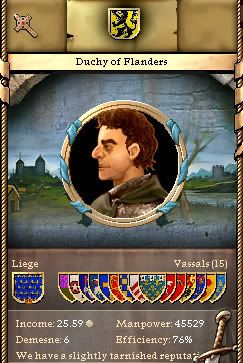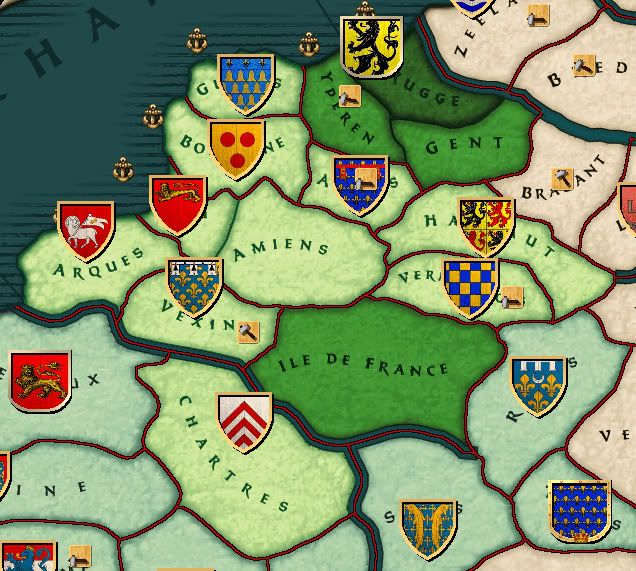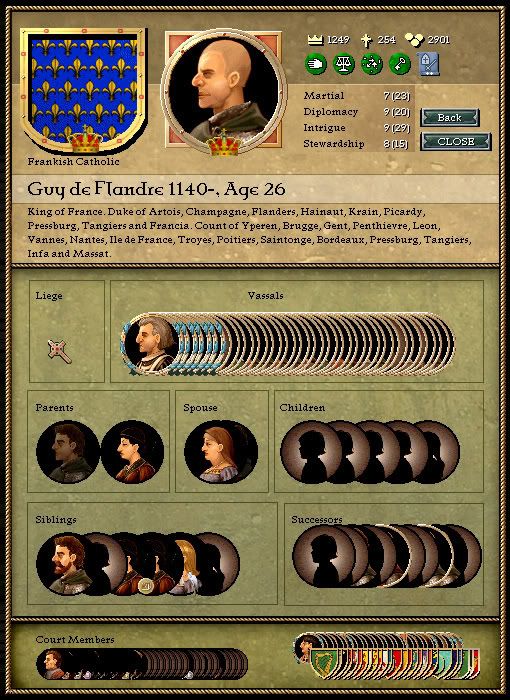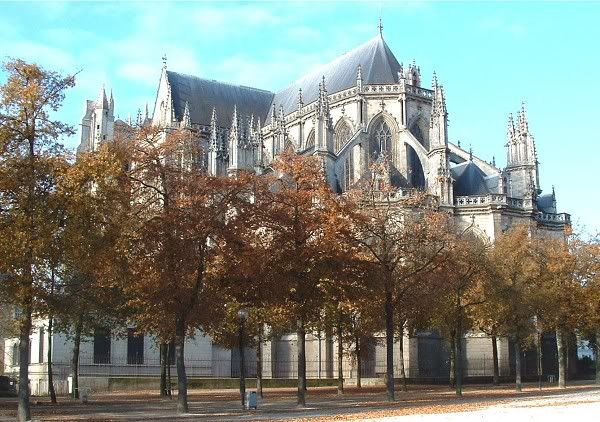Finally, an update. 

The Kingdom of France in 1163, after Flanders became their vassal.



And a new one, Guy upon his inheritance of the Duchy of Flanders.

Part 14: From the Chronicles of Henri I de Flandre (by Jean Froissart), 1156-1167
Now that the Duchy of Flanders was free of the yoke of England, Henri felt that he and his realm needed a couple years of peace. So, from 1156 to 1162, Henri focused on internal improvement. Construction began on a glass blowing facility in Nieuwpoort. Henri had forgotten that typhoid still plagued the region, and soon afterward the project was abandoned. There wasn’t much else that could be done to improve Henri’s realm for a long time besides attracting moneylenders, but he did not as it would go against the church’s whim. Finally in 1161, some knights templar from the chapter house in Brugge came to Duke Henri. They stated that they were establishing a new chapter in Pressburg, closer to the Holy Land, and requested financial assistance in constructing it. Henri, being the pious man he was, gladly agreed to help, as it would provide more soldiers in the future.
Independence did bring its dangers, however. One such danger almost occurred early in the era of Flemish independence. In 1160, the warmongering King of Denmark, Ludolf Billung, declared war on the County of Holland. Henri had to abandon his loyal vassal or else become involved in a war that he would surely lose. If Denmark were to declare war and invade Flanders itself, Henri would be at a fifteen thousand-man disadvantage in terms of army size. The County of Holland was quickly destroyed and annexed into Ludolf’s realm, while the court of the County, including the boy king Gerhard von Wetterau, fled to Flanders for safety. Ludolf, in a message to Henri, claimed it was revenge for invading and taking the County of Guines from Saxony after his uncle Adolf inherited the County.
For three years after the Denmark-Holland war the Kingdom of Denmark constantly threatened Henri and stated many times that he would soon wipe the Duchy of Flanders off the map if Henri did not agree to become a vassal of Denmark. Henri was not foolish, however, and did not submit to this pressure as the other northern German duchies had done after the German Civil War and as Bavaria would do later. But he would need protection from this menacing beast to the north and east. In February of 1163, Henri submitted and became a vassal, of France. After three years of threats, Henri decided enough was enough and that he had better find protection. Henri traveled to Troyes to visit his son, Guy. While he was there, he requested that Guy take Flanders in as a vassal to protect his father’s realm, one that Guy would hopefully soon inherit. Guy was glad to take his father under his leadership, as he would be able to see his father much more often.

The Kingdom of France in 1163, after Flanders became their vassal.
Now that the Duchy of Flanders was a vassal of France, Henri could feel good that he was being protected from the wrath and pressure of the Kingdom of Denmark. Hneri, now 45, continued to work on provincial improvements. In 1165, the typhoid in Yperen finally diminished and because it wasn’t a problem anymore, the people could start work on the glassworks there. It was completed in 1166. Also in 1165, some peasants in rural Pressburg rose up in revolt and advanced on the city because they believed the burghers were not paying them enough for their crops before being sold on the market. The local army was called in to quell the rebellion, which was squished quickly.
One day in May of 1167, Henri fell down the steps of his palace as he was heading downstairs to a royal feast. He was bedded for the next two weeks while some minks from the nearby monastery came to diagnose and treat him. They recommended leeching in the wound, and this treatment was given to Henri. Despite the doctors’ best treatment, Henri, at age 46, died within two weeks later in his bed and was given a burial in the cemetery of the church in Brugge. The Duchy of Flanders then passed to direct control of the King of France, and the de Flandre line moved up a rung on the ladder of nobility.



And a new one, Guy upon his inheritance of the Duchy of Flanders.

Last edited:











